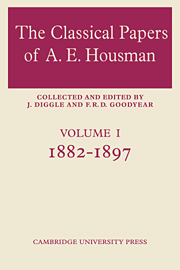Book contents
- Frontmatter
- Contents
- Preface
- List of editions consulted
- Abbreviations
- 1 Horatiana 〚I〛
- 2 Ibis 539
- 3 On Soph. Electr. 564, and Eur. I.T. 15 and 35
- 4 On certain corruptions in the Persae of Aeschylus
- 5 Isocr. Paneg. §40
- 6 Schol. on Aesch. P.V. 488 〚472〛
- 7 CωφPONH
- 8 Emendationes Propertianae
- 9 The Agamemnon of Aeschylus
- 10 Note on Emendations of Propertius
- 11 Horatiana 〚II〛
- 12 Notes on Latin poets 〚I〛
- 13 Persius III. 43
- 14 Conjectural emendations in the Medea
- 15 Review: T. G. Tucker, The Supplices of Aeschylus
- 16 Review: I. Flagg, Euripides' Iphigenia among the Taurians
- 17 Horace, Carm. iv. 2, 49
- 18 Notes on Latin poets 〚II〛
- 19 Horatiana 〚III〛
- 20 Emendations in Ovid's Metamorphoses
- 21 The new fragment of Euripides
- 22 Adversaria orthographica
- 23 The Oedipus Coloneus of Sophocles
- 24 Sophoclea
- 25 Remarks on the Vatican Glossary 3321
- 26 Soph. Oed. Col 527
- 27 The manuscripts of Propertius 〚I〛
- 28 The manuscripts of Propertius 〚II〛
- 29 Review: K. P. Schulze, Catulli Veronensis liber
- 30 The manuscripts of Propertius 〚III〛
- 31 A note on Virgil
- 32 The manuscripts of Propertius 〚IV〛
- 33 Review: J. P. Postgate, Sexti Properti carmina
- 34 Cicero Pro Milone c. 33 §90
- 35 Ovid's Heroides 〚I〛
- 36 Ovid's Heroides 〚II〛
- 37 Ovid's Heroides 〚III〛
- 38 Ovid's Heroides 〚IV〛
- 39 Ovid's Heroides 〚V〛
39 - Ovid's Heroides 〚V〛
Published online by Cambridge University Press: 15 March 2010
- Frontmatter
- Contents
- Preface
- List of editions consulted
- Abbreviations
- 1 Horatiana 〚I〛
- 2 Ibis 539
- 3 On Soph. Electr. 564, and Eur. I.T. 15 and 35
- 4 On certain corruptions in the Persae of Aeschylus
- 5 Isocr. Paneg. §40
- 6 Schol. on Aesch. P.V. 488 〚472〛
- 7 CωφPONH
- 8 Emendationes Propertianae
- 9 The Agamemnon of Aeschylus
- 10 Note on Emendations of Propertius
- 11 Horatiana 〚II〛
- 12 Notes on Latin poets 〚I〛
- 13 Persius III. 43
- 14 Conjectural emendations in the Medea
- 15 Review: T. G. Tucker, The Supplices of Aeschylus
- 16 Review: I. Flagg, Euripides' Iphigenia among the Taurians
- 17 Horace, Carm. iv. 2, 49
- 18 Notes on Latin poets 〚II〛
- 19 Horatiana 〚III〛
- 20 Emendations in Ovid's Metamorphoses
- 21 The new fragment of Euripides
- 22 Adversaria orthographica
- 23 The Oedipus Coloneus of Sophocles
- 24 Sophoclea
- 25 Remarks on the Vatican Glossary 3321
- 26 Soph. Oed. Col 527
- 27 The manuscripts of Propertius 〚I〛
- 28 The manuscripts of Propertius 〚II〛
- 29 Review: K. P. Schulze, Catulli Veronensis liber
- 30 The manuscripts of Propertius 〚III〛
- 31 A note on Virgil
- 32 The manuscripts of Propertius 〚IV〛
- 33 Review: J. P. Postgate, Sexti Properti carmina
- 34 Cicero Pro Milone c. 33 §90
- 35 Ovid's Heroides 〚I〛
- 36 Ovid's Heroides 〚II〛
- 37 Ovid's Heroides 〚III〛
- 38 Ovid's Heroides 〚IV〛
- 39 Ovid's Heroides 〚V〛
Summary
XVI 35–40
Te peto, quam pepigit lecto Venus aurea nostro:
te prius optaui quam mihi nota fores.
ante tuos animo uidi quam lumine uultus:
prima fuit uultus nuntia fama tui.
nee tamen est mirum si, sicut oporteat, arcu
missilibus telis eminus ictus amo.
Verse 38 is so given by P and G and most MSS: V (saec. XII) has ‘prima mihi uultus’. The sense is poor, and the repetition of ‘uultus’, first plural, then singular, is poorer. ∥ To all intents and purposes the verse has already been emended by Mr Palmer: ‘prima mihi uulnus nuntia fama tulit’: see the metaphor of the next distich. But in writing mihi Mr Palmer abandons better MSS for a worse, and in writing tulit he abandons all MSS: I would sooner follow them where they agree and desert them where they differ:
prima tulit uulnus nuntia fama tui.
‘tui’ depends on ‘nuntia’. I suppose the archetype had
prima tui uultus nuntia fama tui,
and fuit and mihi are alternative corrections of this manifest error.
From 38 to 145 all good ancient MSS fail us and leave us to the mercies of the 15 th century. Accordingly the very next verse is corrupt, oporteat is not even grammar; the oportuit actum or oportet ab arcu of Heinsius has no sufficient sense; Bentley rightly expels the couplet and proposes Apollinis for oporteat, but I think the original form of the interpolation can be recovered with less ado:
nec tamen est mirum si, sic cum polleat arcus,
missilibus telis eminus ictus amo.
Information
- Type
- Chapter
- Information
- The Classical Papers of A. E. Housman , pp. 412 - 422Publisher: Cambridge University PressPrint publication year: 1972
